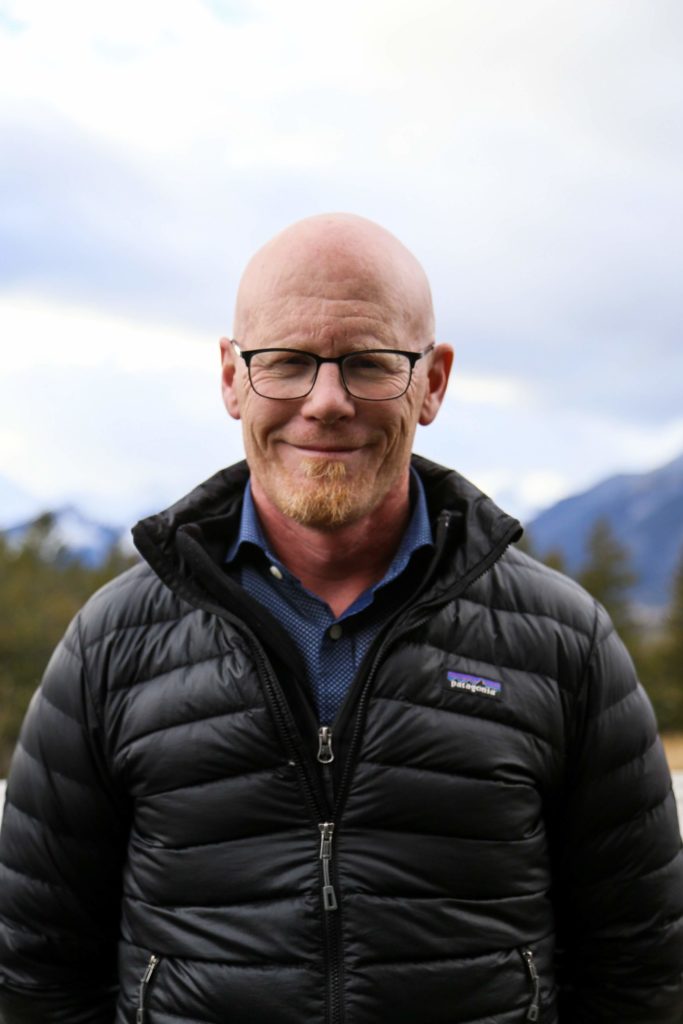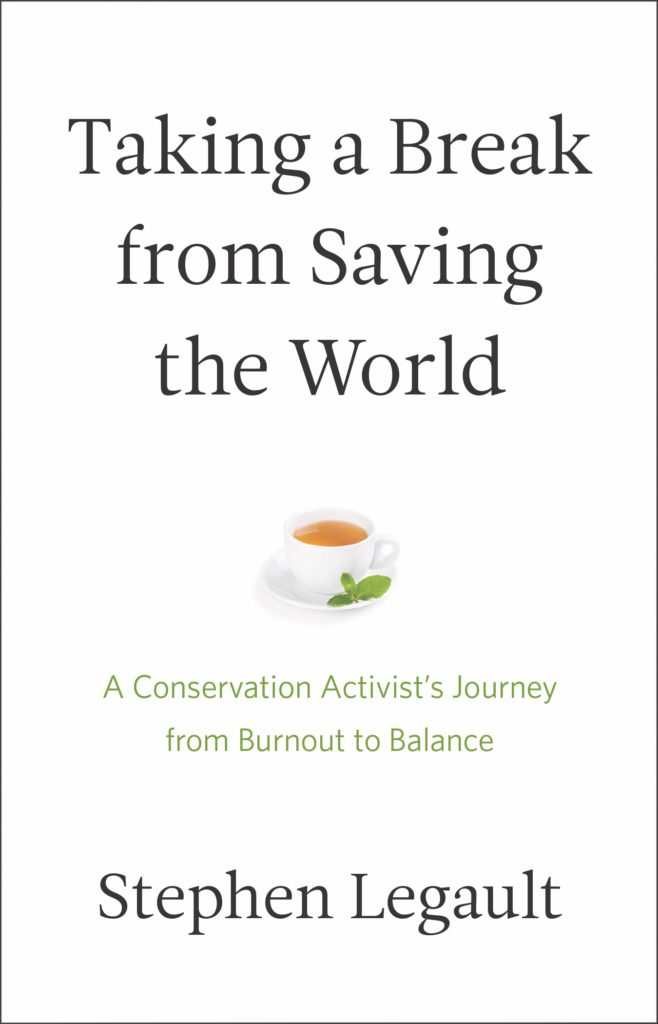by Maryann Kerr (June 2, 2020)
Taking a Break from Saving the World, A Conservation Activist’s Journey from Burnout to Balance, Stephen Legault, Rocky Mountain Books, May 5, 2020, Paperback, 168 pp., $19.80
I was not looking forward to reading Stephen Legault’s Taking a Break from Saving the World, A Conservation Activist’s Journey from Burnout to Balance. I’ve experienced burn-out, was fired because of it, and worried that there would be too many triggers. As well, I’m not a terribly “outdoorsy” person. I don’t paddle, rarely get in our beautiful cedar strip canoe, unless someone else is prepared to do all the work and wasn’t sure I’d understand the overall metaphor Legault posits around the need to “eddy out.”
As it turns out, I loved this book. A lot. Legault is open, honest and at times jarringly vulnerable as he shares his story. If you have suffered burnout, you will find in these pages solace, wisdom, and practical advice on how to avoid it. On the first page Legault shares,
“…I got fired. It wasn’t the first time I’d lost a job, but it was the most difficult dismissal of my professional career, and it was the motivation for writing this book.”
I immediately connected with his story and am certain others who work in the social profit sector will too. I connected with his passion for his work, the long hours, the sense that what you are doing really matters and that pausing is not an option. He writes,
“Hadn’t I learned a thing? The truth was, I had, but sometimes – despite intellectual knowledge – those who are compelled to dedicate their lives to making a difference sacrifice themselves on the altar of ego, pride and unrealistic expectations. As the summer of 2018 wore on, I realized I now had another shot at learning what to do when taking on heavy water. To do so I had to take responsibility for my own part in being tossed overboard, and for how I would move forward the next time I got in a boat.”
Taking A Break from Saving the World is a useful tool if you find yourself at a crossroads where intentional reflection might help you consider how best to move ahead. Legault shares the importance of compassion for both yourself and others and encourages us to examine the stories we tell ourselves as they have incredible power. Legault is described as a lifelong advocate for advocates. He “champions people who care for the human condition and the protection of nature and seeks to serve them as they live fulfilling and rewarding lives making the world a better place.” He writes for those of us who have dedicated our careers to mending the world.
Legault’s many years in the social profit sector, as a conservation activist, layer his words with depth and credibility. His passion for the environment is expressed in the metaphor of the book itself, set up as a paddling guide. At the end of each chapter, Legault provides tips on technique with a focus throughout on the idea that at times we must “eddy out.”
“To “eddy out” is a phrase coined by canoeists, kayakers and other river runners. When you’re paddling a river – especially one with rapids and other obstacles – sometimes you need to take a break in order to rest, scout the way forward or just appreciate the majesty of moving water.”
Paddling is woven throughout the book as is thoughtful consideration for how to manage our careers. Legault asks us to think about what we want from our work, what we expected of our work and how we want to feel at work. These are not the questions we often give much thought to, yet they are critical to understanding how to avoid burnout and disappointment at work. Further, Legault recognized the importance of self-management and self-awareness as critical success factors for those of us who work to “save the world.”
“I didn’t see – despite my friends, my wife and even my children telling me – that the job was taking its toll. I didn’t see it because I didn’t want to see it. I both loved and hated the work, much in the way an alcoholic loves and hates the next drink. I had allowed the work to define me and, as a result, couldn’t imagine what it would be like to lose the meaning it brought me. I was dependent on it for my sense of self-worth.”
Legault’s ability to describe beautiful spaces and adventures in nature is poetic and lyrical. You believe that he draws strength from the Belly River in southwestern Alberta captured in his photographs and words. You believe that you too can find what inspires you, return there and resurface stronger and more resilient. Legault does not pretend to take on the systems that impact burnout in our sector. He identifies instead with the personal side of this journey, which is just as necessary as the critique of the system itself. One without the other simply doesn’t work.
Sometimes, we learn the most about an author and what makes a book beautiful in the preface, dedications and gratitude. This was true here. These words:
“Everything in this book may be wrong. It’s offered with the best of intent, but it’s personal opinion and may be out in left field. You’ve been warned.”
*
Q & A with Stephen Legault

Maryann Kerr: Photography, creative pursuits and outdoor activities clearly made up part of your recovery from burnout. What role does writing play?
Stephen Legault: Writing has always been important to my mental health. I attempt to order my world with writing, letting my fingers lead me through process from something akin to a mental gumbo towards something a little more well-arranged. (It doesn’t always/often work). Often times just jotting down a few lines – in this case the words “eddy out” – were a good start to the recovery process.
Maryann Kerr: If one of your children told you today, they want to follow in your footsteps and be a conservation activist – what would you say?
Stephen Legault: I think it is possible, if not likely, that one or both of my kids will become activists at some point in their lives. It would make me proud, through I’m certainly not pushing them in this direction, if they were to follow in my footsteps. I’d give them this advice: skip over the places where my footprints look as if they were made by someone fumbling around in the dark, struggling to find a light switch in a room full of hassocks and random bits of Lego. The reality is, you can take all the advice and have all the intellectual knowledge about how to avoid burnout and stay effective in our effort to make the world a better place, but it is the lived experience that teaches us the most. I’d say, “Good luck, I’m proud of you and call me up when you feel as if things are getting to crispy.”
Maryann Kerr: When you talk about eddying back in, though you describe a short term gig, you immediately went to working 60 hour weeks. I was surprised. What does the “perfect” eddy in look like to you today? If you didn’t have to worry about paying the bills – what would you do?
Stephen Legault: The short term gig was an election campaign, and they are always intense, but at least with elections – most of them – they are over when they are over, and you know if you won or lost. The perfect eddy in? I don’t know that it exists. The elements I’m looking for are calm, balanced, and effective. It sounds pretty simple, but its anything but. There’s a lot of water racing by, and the eddy line can be pretty “sharp” so sometimes it takes a few tries to peel off nicely and get back in the flow of things. I just try to remember that you don’t have to paddle this river called “A Better World” all in one reach, there’s another eddy just around the bend.
Maryann Kerr: Has the global pandemic changed your world view in any way and if so how? If not, how has your world view helped you through this time?
Stephen Legault: Just a tiny little question…. Yes, it has, and no it hasn’t. My priorities are still the same: tackle climate change and protect nature, but what I think is possible is different. We’ve proven that we can do a 180 pretty quickly when faced with imminent danger. What we haven’t demonstrated is an ability to maintain new systems for more than a few months. It may yet come, but I worry we may miss the moment and have to go through the whole thing again (and again). My world view has both helped and hindered: at the fundamental level I see all life as interconnected, and that helps me remember to love without condition or judgement. However, that paradigm of interconnectedness makes it tough when I see people behaving in a way that makes me question human judgement. There’s never a dull moment over here.
*
Maryann Kerr is currently the Chief Happiness Officer/CEO and principal consultant with the Medalist Group, a philanthropic firm she founded in 2006. She has served local, provincial and national organizations in executive leadership.

Leave a Reply
You must be logged in to post a comment.